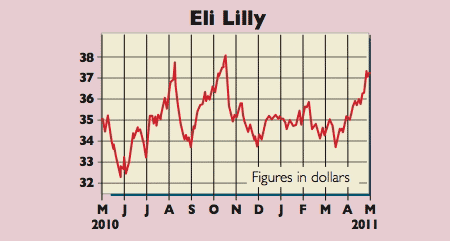Get the latest financial news, insights and expert analysis from our award-winning MoneyWeek team, to help you understand what really matters when it comes to your finances.
You are now subscribed
Your newsletter sign-up was successful
Want to add more newsletters?

Twice daily
MoneyWeek
Get the latest financial news, insights and expert analysis from our award-winning MoneyWeek team, to help you understand what really matters when it comes to your finances.

Four times a week
Look After My Bills
Sign up to our free money-saving newsletter, filled with the latest news and expert advice to help you find the best tips and deals for managing your bills. Start saving today!
Wall Street used to love Big Pharma. In the late 1990s, stocks in the sector often traded on earnings per share (EPS) multiples of around 20. But not anymore. The US healthcare sector is trading on 2011 p/e (price/earnings) ratios of below 12. This seems odd, given that, for the next two years, profits are expected to rise on average by 10% a year.
So why has pharma fallen out of favour? It's partly due to US president Barack Obama's health reforms and the threat from cheaper generic drugs as patents expire. Also, tighter regulation means it's becoming harder and dearer to launch new treatments. And while total spending on the sector has climbed, governments, hospitals and patients are reaching the limit of what they can afford to pay.
But the dramatic sell-off looks overdone. The fundamentals of ageing populations and greater demand from emerging markets remain intact. China, for example, faces a demographic timebomb from 2030, thanks to its one-child policy. And if you're worried about inflation, Big Pharma looks a good bet. The industry doles out hefty yields, isn't especially vulnerable to soaring commodity prices, and enjoys decent pricing power in other words, cost increases tend to get passed on to users, leaving margins unscathed.
MoneyWeek
Subscribe to MoneyWeek today and get your first six magazine issues absolutely FREE

Sign up to Money Morning
Don't miss the latest investment and personal finances news, market analysis, plus money-saving tips with our free twice-daily newsletter
Don't miss the latest investment and personal finances news, market analysis, plus money-saving tips with our free twice-daily newsletter
Take Eli Lilly, a $40bn business that focuses on the treatment of mental illness, cancer and diabetes. In the first quarter of this year, sales were up 6%, boosted by China. The board expects underlying EPS to come in at $4.15-$4.30 on flattish revenues. That puts the stock on a rating of below nine times earnings, while paying a 5% dividend yield.
Eli Lilly (NYSE: LLY), rated a BUY by BMO Capitla Markets

The next few years could be tough. Lilly is approaching a series of patent expiries relating to four of its blockbusters. In total, these account for around half of the group's turnover. Its schizophrenia medicine Zyprexa loses protection in October, followed by Cymbalta (anti-depressant) and Humalog (for diabetes) in 2013 and finally Evista (breast cancer) in 2014.
But all is not lost. European regulators recently approved Bydureon, a diabetes drug Lilly has co-developed with Amylin Pharmaceuticals and Alkermes. And the group is on track to refill its pipeline with ten promising compounds in late-stage clinical trials by December. So over the next four years, new product launches should offset much of the 'patent cliff' problem. And adding these to its other products, total sales and underlying EPS should come in at around $21bn and $4 respectively in 2014. Thereafter profits should accelerate by double digits again.
I'd rate the stock on 15 times EPS. Discounting back at 10% a year gives you an intrinsic worth of $42 per share. And given that the sector is consolidating, I wouldn't be surprised if a larger rival came knocking at these levels. The synergies of combining sales forces, research and development, and distribution systems could add another $10 a share to the price. Of course, there's a currency risk in buying non-UK shares. But overall, Lilly looks a reliable income play. First-half figures are due 21 July. BMO Capital has a target price of $43.
Recommendation: BUY at 437.20
Get the latest financial news, insights and expert analysis from our award-winning MoneyWeek team, to help you understand what really matters when it comes to your finances.
Paul gained a degree in electrical engineering and went on to qualify as a chartered management accountant. He has extensive corporate finance and investment experience and is a member of the Securities Institute.
Over the past 16 years Paul has held top-level financial management and M&A roles for blue-chip companies such as O2, GKN and Unilever. He is now director of his own capital investment and consultancy firm, PMH Capital Limited.
Paul is an expert at analysing companies in new, fast-growing markets, and is an extremely shrewd stock-picker.
-
 Can mining stocks deliver golden gains?
Can mining stocks deliver golden gains?With gold and silver prices having outperformed the stock markets last year, mining stocks can be an effective, if volatile, means of gaining exposure
-
 8 ways the ‘sandwich generation’ can protect wealth
8 ways the ‘sandwich generation’ can protect wealthPeople squeezed between caring for ageing parents and adult children or younger grandchildren – known as the ‘sandwich generation’ – are at risk of neglecting their own financial planning. Here’s how to protect yourself and your loved ones’ wealth.